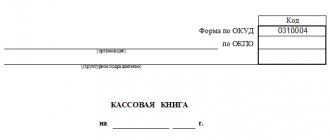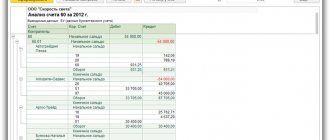Cash circulating in the organization must be constantly accounted for. One of the most common forms of audit related to cash transactions is the audit of cash and cash transactions. It is carried out in order to certify the accuracy, comprehensiveness and truth of the data on cash transactions that were provided in regular reporting.
Let’s take a closer look at the tasks set for a cash audit, clarify the persons and bodies that have the right to conduct it, and also analyze the procedure provided for by law, with all its features, subtleties and pitfalls.
In what sequence is an audit of an organization's cash transactions ?
Revision, verification, audit
It is necessary to control the cash flow in the cash register so that the entrepreneur has a real financial picture, correctly reflected in financial and accounting documents.
If the company operates significant funds, this increases the likelihood of errors, inaccuracies, incorrect display, and sometimes deliberate abuse by unscrupulous employees. For this purpose, regular checks of cash transactions should be carried out, usually carried out by representatives of the organization itself (accountant, cashier, etc.).
Why is a program for checking cash transactions ?
Features of the revision
A cash register audit differs from an audit in its complexity. An audit does not imply control of any individual element or the use of one method, but a special procedure aimed at checking the entire cash system of the organization. It can be carried out either in-house or by third-party bodies, according to plan or suddenly.
The procedure for conducting cash transactions , compliance with cash discipline by organizations and individual entrepreneurs
The essence of a cash register audit
An audit of cash transactions allows you to answer the question of whether cash accounting is maintained correctly in the organization. Independent audit specialists hired by the owner of the organization will accurately establish the degree of reliability of the organization’s employees responsible for the cash register. Also, the audit procedure is mandatory for companies engaged in certain types of activities, for example, the sale of securities.
IMPORTANT INFORMATION! The most important difference between an audit and other control procedures is the lack of a focus on finding guilty parties. The audit aims only to identify the presence of certain violations in cash transactions and determine the degree of their significance.
Fines for violation of cash discipline
The development of principles of cash discipline is the authority of the Central Bank of the Russian Federation, but the Federal Tax Service is responsible for holding people accountable for its violation. Since 2012, it is within the powers of the tax authorities to control this area of activity.
What fines are provided for violation of cash discipline?
The amount of fines provided for violation of cash discipline does not depend on what specific rules were not followed. According to the Code of Administrative Offenses of the Russian Federation, any non-compliance with the law not related to the use of cash register devices (blocks 1-4) is punishable by fines from 40,000 to 50,000 rubles.
Regarding the use of fiscal control equipment (block 5), sanctions differ depending on the nature of the offense.
Non-use of CCP:
- from 75 to 100% of the calculated amount (but not less than 30,000 rubles) - for legal entities;
- from 25 to 50% of the calculated amount (but not less than 10,000 rubles) - for individual entrepreneurs.
Use of equipment that does not comply with the law, failure to comply with the procedure for its registration and use:
- from 5,000 to 10,000 rubles - for legal entities;
- from 1,500 to 3,000 rubles - for individual entrepreneurs.
Failure to issue a check to the buyer or not send it:
- 10,000 rubles - for legal entities;
- 2,000 rubles - for individual entrepreneurs.
- 117 reviews
Atol 30F
16,700 ₽ Add to favorites
16 700₽
https://online-kassa.ru/kupit/atol-30f/
OrderMore details In stock
- 54 reviews
Atol Sigma 7
17,900 ₽ Add to favorites
17 900₽
https://online-kassa.ru/kupit/atol-sigma-7/
OrderMore details In stock
- 108 reviews
PTK MSPos-K
21,653 ₽ Add to favorites
21 653₽
https://online-kassa.ru/kupit/ptk-mspos-k/
OrderMore details In stock
- 111 reviews
Evotor 7.3
32,409 ₽ Add to favorites
32 409₽
https://online-kassa.ru/kupit/evotor-7-3/
OrderMore details In stock
Who has the right to carry out a cash audit?
Persons who may be authorized to control the cash transactions of a particular organization can be either its internal representatives or external specialists. The following can carry out an audit of cash transactions:
- representatives of the internal control of the organization itself (cashier, accountant, financial department specialist, etc.);
- authorized specialists from Rosfinnadzor;
- Federal Tax Service authorities;
- private auditors;
- employees of audit firms.
ATTENTION! Until recently, credit organizations (banks) also had the right to audit cash transactions. The new Order No. 373-P abolished their powers to carry out such inspections.
Application Obligations
All organizations and individual entrepreneurs working with cash are required to apply the requirements for compliance with cash discipline. Moreover, the organizational and legal form and form of ownership, as well as the tax system, do not play any role. All cash transactions must be reflected and documented in the prescribed manner.
Unified forms that are used as primary accounting documents remain mandatory. These are the forms approved by Resolution of the State Statistics Committee of the Russian Federation dated August 18, 1998 No. 88:
- cash receipt order (abbr. PKO, OKUD code 0310001);
- expense cash order (abbr. RKO, OKUD code 0310002);
- cash book (OKUD code 0310004).
When issuing wages from the cash register, a payroll (OKUD code 0301011) or a payroll slip (OKUD code 0301009) approved by Resolution of the State Statistics Committee of the Russian Federation dated January 5, 2004 No. 1 is used.
IMPORTANT!
By letter dated July 21, 2017 No. 03-01-15/46715, the Ministry of Finance of the Russian Federation confirmed that it is not necessary to use standardized forms related to the use of cash registers, approved by Resolution of the State Statistics Committee of Russia dated December 25, 1998 No. 132 and the Ministry of Finance of the Russian Federation dated August 30, 1993 No. 104.
Optional forms include:
- an act on the transfer of summing cash counters to zeros and registration of control counters of a cash register machine (KKM);
- an act on taking readings from control and summing cash counters when handing over (sending) the cash register for repairs and when returning it to the organization;
- cashier-operator's journal;
- certificate of payment from the cashier-operator;
- log of readings of summing cash and control counters of cash registers operating without a cashier-operator;
- an act of returning money to buyers (clients) for unused checks (including erroneously punched checks);
- log of calls to technical specialists and registration of work performed;
- information about cash register counter readings and the organization’s revenue;
- act on checking cash in the cash register.
What is checked during a cash register audit
From a documentary point of view, the audit result allows us to assess the correctness of filling out Form No. 1 from the accounting reporting documentation, namely field 1250 “Cash and cash equivalents”. This balance sheet field takes into account the actual finances remaining at the end of the reporting period. If the figure turns out to be very high (significant), this is a real reason for an audit. The degree of “materiality” is calculated using a special method.
NOTE! An audit of cash transactions in each current year can only be carried out in relation to the indicators of the previous reporting year.
To establish compliance of cash transactions with legal regulations, auditors check:
- compliance with the rules for conducting cash transactions;
- correct use of cash registers;
- compliance of cash balances in the cash register with legally established limits;
- maintaining maximum amounts for cash payments;
- general provisions of the organization's accounting policy regarding cash accounting;
- evidence of correct reflection of the balance in account 50 “Cash” in the balance sheet;
- in-depth analysis of sources of financial income and directions of their expenditure in the organization;
- studying primary documentation (cash orders, statements, etc.) for inconsistency and correctness of maintenance;
- checking for the possibility of “laundering” income and the operation of corruption schemes (within the framework of Federal Law No. 115 of August 7, 2001 “On Combating the Laundering of Income...” and Federal Law No. 273 of December 25, 2008 “On Combating Corruption”).
Knowledge of cash discipline. What it is
Knowledge of cash discipline presupposes that the company complies with all the norms of current legislation on conducting transactions with funds (this also applies to entrepreneurs).
These requirements can be divided into several large blocks, which include smaller norms and conditions:
The first block is the preparation of the necessary documents that reflect the cash flow in the cash register. The chief accountant, cashier or other employee must ensure the preparation of mandatory reports. For example, receipt and expenditure orders (PKO, PKO) must accompany the issuance of money from the cash register and its receipt. It is important to fill out all the details correctly so that the completed documents are considered valid. In addition, PKO and PKO must be entered into a special company cash book, which allows for daily reconciliation of actual and documented cash transactions.
It is noteworthy that with the introduction of online cash registers, the list of required documentation has been reduced. Previously, it was necessary to additionally draw up such forms as TORG-1, KM-1 and others. The introduction of online cash register systems made the preparation of such reports optional (which is confirmed in the clarifications of the Ministry of Finance dated September 16, 2016 N 03-01-15/544413).
The second block is compliance with cash register limits. The law prohibits keeping cash in the cash register in excess of a specially established limit. For this, there are special formulas for calculating limits, which the organization must calculate independently. If at the end of the working day there is more money left in the cash register than established by the internal Order, a fine of up to 50 thousand rubles may be imposed on the organization. Amounts in excess of the limit must be collected into the current account.
- 45 reviews
Rent an online cash register MTS Kassa 7
900 ₽ Add to favorites
900₽
https://online-kassa.ru/kupit/arenda-onlajn-kassy-mts-kassa-7/
OrderMore details In stock
The third block is the issuance of money to accountable employees (company employees) . We are talking about payment of travel expenses, money for household needs, etc. It is important to follow the procedure for issuing such funds. It is necessary to receive a correctly completed application from the employee and make sure that he has no debt to the employer. The employee is required to provide an advance report on the use of the money issued within three days after the end of the period by which the advance was paid. Receipts and other documents confirming expenses must be attached to the report).
The fourth block is the limitation of cash payments between entrepreneurs within the same agreement. A very important rule, non-compliance with which can result in serious fines. Legal entities and private entrepreneurs cannot pay in cash if an agreement has been concluded between them for an amount exceeding 100 thousand rubles. This requirement does not apply to settlements with individual consumers.
The fifth block is working with cash register machines. The use of cash register equipment is regulated by Law No. 54-FZ. In addition to the main statement that companies and individual entrepreneurs must use cash registers when selling goods, services and work (with rare exceptions), there are also requirements for the equipment itself. Most companies are required to use online cash register systems. In addition, it is important to use control equipment that meets all standards, exchange information with the Federal Tax Service, issue fiscal documents in the approved form, timely service and register cash registers (replace the fiscal drive, register the cash register and re-register it with the tax office).
Subscribe to our channel in Yandex Zen - Online Cashier! Be the first to receive the hottest news and life hacks!
Nuances of internal cash control
To ensure its own awareness of the correctness of the movement and actual cash balances, each legal entity has the right to develop its own provisions for the internal audit procedure for the cash register. It is imperative to prescribe this procedure in internal regulations, indicating the essential points:
- timing of cash audits;
- persons (positions) who are authorized to carry out inspections;
- list of cash documents subject to control;
- audit objects;
- samples of documentation of audit results;
- responsibility for possible identified discrepancies and the persons bearing it;
- the procedure for making recommendations to eliminate found violations.
FOR YOUR INFORMATION! If cash accounting at the enterprise is automated, then, in addition to the usual checks, you should monitor the correct operation of the relevant software.
The results of the audit are stated in the inspection report . If a surplus or shortage of cash is discovered, the report must indicate in detail the circumstances under which they were discovered and provide the exact amount.
Registering an online cash register with Multikas
We will help you with the registration and re-registration of cash register equipment with the tax office (FTS) in one day. We will register your online cash register at a competitive price.
More about the offer
It is also worth remembering that for failure to comply with the rules for using cash register equipment, a fine for online cash registers may come within a year after the violation. Therefore, even if the tax authorities did not immediately detect your violation, it is too early to rejoice: they can detect it within a year and impose appropriate penalties.
The audit is carried out by Rosfinnadzor
Representatives of Rosfinnadzor, when conducting a cash audit, act in accordance with clause 5.14.1 of the Regulations on the Federal Service for Financial and Budgetary Supervision, approved by Decree of the Government of the Russian Federation of June 15, 2004 No. 278, Regulations on the territorial bodies of the Federal Service for Financial and Budgetary Supervision, approved by the Order Ministry of Finance of the Russian Federation dated July 11, 2005 No. 89n.
During an audit or verification of cash transactions, Rosfinnadzor (its territorial divisions) carries out a set of actions aimed at studying the documentary and factual side of the organization’s cash discipline in a specific period. The inspection can be complete or selective, scheduled or unscheduled. During its course the following is carried out:
- analysis of information obtained from financial, accounting, cash and other reporting;
- inspection;
- inventory;
- recalculation and other methods of actual control.
The period for conducting an audit by Rosfinnadzor cannot be more than 45 days. Each time it is installed individually.
The audit plan includes various actions aimed at establishing the correctness of cash transactions, namely:
- checking whether the contract with the cashier reflects his financial responsibility;
- presence of signatures confirming that authorized persons are familiar with the rules for conducting cash transactions and financial liability;
- features of storing money, check books, cash books;
- papers relating to the processing of monetary transactions (receipt and withdrawal);
- whether money is deposited in OFK on time and in full;
- not exceeding the limit on cash payments and cash balance;
- separation of own funds from those not belonging to this organization (if any at the time of the audit);
- correct maintenance of the register of deposited amounts and control of their delivery to the bank on time;
- correctness of maintaining accumulative statements;
- the truth of the papers containing the grounds for writing off cash expenses;
- study of documents related to cash transactions (cash book, balance sheet documentation, financial statements, check books, journals for recording receipts and expenditure orders, inventory lists, statements, etc.).
The result of the inspection is documented in a document. The detected shortage is recovered from the financially responsible person, the surplus is subject to capitalization. It is also necessary to request a written explanation from the cashier regarding the detected violations and evaluate its persuasiveness.
Who must comply
The need to maintain cash discipline does not depend on the availability of a cash register or the chosen taxation system.
Even if you do not have a cash register (for example, you fall into the exceptions from Article 2 of Law 54-FZ), you must still follow the rules of cash discipline. There is only one rule here - if there is cash flow, then cash discipline must be observed.
However, since June 2014, a simplified procedure for maintaining cash discipline
, which most affected individual entrepreneurs. Now individual entrepreneurs are no longer required to maintain a cash register on a par with organizations and draw up cash documents (PKO, RKO, cash book). Entrepreneurs only need to generate documents confirming the payment of wages (payroll and payslips).
Also, according to the simplified procedure, individual entrepreneurs and small enterprises (number of employees no more than 100 people and revenue no more than 800 million rubles per year) are no longer required to set a limit
cash balance at the cash register.
All rules of cash discipline are listed in the instructions of the Bank of Russia (Instruction No. 3210-U dated March 11, 2014 and Instruction No. 3073-U dated October 7, 2013).
The audit is carried out by tax authorities
Tax authorities, as part of a cash audit, focus on checking the use of cash register equipment, while relying on the provisions of paragraph 1 of Art. 7 of the Federal Law of May 22, 2003 No. 54-FZ “On the use of cash register equipment when making cash payments and (or) settlements using payment cards”, clause 5.1.7 of the Regulations “On the Federal Tax Service, approved by the Resolution Government of the Russian Federation" dated September 30, 2004 No. 506.
Tax authorities try to verify the completeness and accuracy of accounting for cash proceeds, for which they study documentation related to the cash register: its purchase, registration, operation.
ATTENTION! If an enterprise is allowed to use strict reporting forms instead of cash registers, then documents related to the production, acceptance, issuance, storage, inventory and disposal of these forms will be subject to verification.
To carry out the audit, auditors compare the amounts of cash balance in the cash register with those reflected in the documentation (fiscal report, cash register control tape or online reports, entries in the cashier-operator’s journal).
When identifying discrepancies, inspectors seek to identify their causes by obtaining detailed written explanations from responsible persons and analyzing the information obtained during the audit.
The period for checking cash transactions carried out by tax authorities cannot exceed 20 days. The result is necessarily reflected in a standard act.
Checking the intended use of funds
Let us recall that, based on clause 2 of Directive No. 3073-U, autonomous institutions, like other legal entities, have the right to spend cash received in their cash registers in the currency of the Russian Federation for goods sold by them, work performed by them and (or) services provided by them, and also received as insurance premiums exclusively for the following purposes:
- payments to employees included in the wage fund and social payments;
- payment of insurance compensation (insurance amounts) under insurance contracts to individuals who previously paid insurance premiums in cash;
- payment for goods (except for securities), works, services;
- issuing cash to employees on account;
- refund for previously paid in cash and returned goods, uncompleted work, unrendered services;
- issuance of cash when carrying out transactions by a bank payment agent (subagent) in accordance with the requirements of Art. 14 of the Federal Law of June 27, 2011 No. 161-FZ “On the National Payment System” .
Spending cash in the currency of the Russian Federation received at the cash desk of an institution for goods sold, work performed and (or) services provided, as well as received as insurance premiums not for the purposes indicated above, is unlawful.
In addition, it should be noted that cash payments in the currency of the Russian Federation for transactions with securities, under real estate lease agreements, for the issuance (repayment) of loans (interest on loans), for the organization and conduct of gambling are carried out at the expense of cash received in cash desk of a participant in cash payments from his bank account ( clause 2 of Directive No. 3073-U ).
We also note: if, in accordance with the Budget Code, an autonomous institution is assigned the responsibilities of a recipient of budget funds, you need to make sure that there are no facts of their misuse. It is advisable to check this issue in parallel with the study of documents that are the basis for making settlements with accountable persons. During the audit, it is necessary to compare the articles and sub-articles of KOSGU (from 2016 - you should pay attention to the type of expenses) for which the advance was issued with those indicated in the advance reports. In addition, it is necessary to analyze the correctness of attributing actually incurred expenses to certain articles and subarticles of KOSGU (type of expenses).
Responsibility for violations identified during a cash audit
During the audit, the auditor can establish a number of violations that occur during cash transactions and the degree of their significance, reflecting the audit risk (the auditor’s confidence in his own conclusions). Typical deficiencies that may be identified by an audit may relate to several areas of cash transactions.
General documentary inconsistencies:
- incorrect filling out of unified “primary” forms;
- non-compliance of documentation with accounting rules;
- lack of necessary details;
- forgery or lack of signatures on primary documentation.
Problems with storing funds:
- insufficient security when moving cash to and from the bank, when issuing salaries, etc.;
- lack of a safe or fireproof cabinet for storing cash balances;
- failure to comply with the rules for storing keys to money vaults;
- failure to sign up for an insurance policy;
- violation of the limit on cash balances on specific dates.
Revenue violations:
- the proceeds are not fully capitalized;
- cash from the cash register is spent illegally;
- discrepancies between entries in the cash book and in the primary records;
- accountable amounts are closed incorrectly.
Violations of cash discipline:
- lack of primary documentation or its absence;
- incorrect execution of cash documentation;
- incorrect reflection of cash transactions in accounting registers;
- mathematical errors in calculating balances and turnover of funds;
- erroneous invoice correspondence;
- shortage or surplus of funds in the cash register;
- non-receipt of funds received at the cash desk;
- illegal or excessive write-off of cash funds;
- misappropriation, theft of funds;
- payments beyond the cash register;
- incorrect or untimely registration of cash registers.
What are the consequences of violations for the perpetrators?
Auditors who discover any violation during an audit have the right to initiate an administrative violation case. The period for initiating such a case is 2 months from the date of establishment of its fact, and prosecution in such a case can be carried out within the usual time limits provided for by administrative law.
Negligent workers and entrepreneurs will have to meet the following requirements of administrative legislation (clause 1 of article 15.1 and clause 2 of article 14.5 of the Code of Administrative Offenses of the Russian Federation):
- violation of the rules of cash transactions, as well as cash discipline, is fraught with a fine: for officials - in the amount of 4-5 thousand rubles, for enterprises - 40-50 thousand rubles;
- For violations related to the operation of cash register systems, officials can be fined 3-4 thousand rubles, and organizations - 30-40 thousand rubles.
Checking the correctness of documents at the cash desk
During the audit, you should pay attention to the following:
1. Filling out all lines and details of cash settlements, cash registers and other documents used in cash transactions, the absence of corrections in them. Thus, according to clause 167 of Instruction No. 157n [3], the cash desk accepts cash from individuals using strict reporting forms approved in the manner prescribed by the legislation of the Russian Federation. In the case of cash acceptance by authorized persons, the latter daily hand over to the institution’s cash desk the funds registered in the document delivery register, accompanied by receipts (copies thereof).
Cash documents must indicate the basis for their execution and list the attached supporting documents (settlement and pay slips, pay slips, statements, invoices, etc.).
Acceptance for accounting of documents documenting transactions with cash or non-cash funds containing corrections is not permitted. Other primary (consolidated) accounting documents containing corrections are accepted for accounting in the case when the corrections are made in agreement with the persons who compiled and (or) signed these documents, which must be confirmed by the signatures of the same persons, indicating the inscription “Corrected believe.” ” (“Corrected”) and the date the correction was made. Making corrections to documents executed electronically after they have been signed is not permitted.
It is also necessary to ensure that all PKOs and RKOs are reflected in the cash book. To do this, you need to compare the entries in the cash book with the data in the cash documents.
2. Availability of required signatures. Let us remind you that cash documents must be signed by the chief accountant or accountant (in their absence, by the manager), as well as by the cashier. In the case of conducting cash transactions and drawing up cash documents by the manager, cash documents are signed by the manager ( clause 4.3 of the Procedure for conducting cash transactions ). However, here it should be taken into account that, by virtue of clause 8 of Instruction No. 157n , documents used to document the facts of economic life with funds are accepted for accounting if the document has the signatures of the head of the institution and the chief accountant or their authorized persons. Thus, in this case, the Procedure for conducting cash transactions contradicts Instruction No. 157n. In order to prevent negative consequences that may arise during the inspection, in our opinion, it is advisable for the institution to be guided by the requirements of the said instructions.
Cash received and issued from the cash register must be recorded in the cash book (f. 0310004). Entries in it must be made for each PKO and RKO.
According to clause 6 of the Procedure for Conducting Cash Operations, the cashier issues cash after identifying the recipient of the cash using a passport or other identification document presented by him in accordance with the requirements of the legislation of the Russian Federation, or using a power of attorney and an identity document presented by the recipient of the cash. Cash issuance is carried out directly to the cash recipient indicated in the cash settlement system (settlement and payment or payroll) or in the power of attorney.
To issue cash to an employee on account of expenses, cash settlement is drawn up in accordance with a written application from the accountable person, drawn up in any form and containing a record of the amount of cash and the period for which the cash is issued, the signature of the manager and the date. In addition, the application must be accompanied by a calculation (justification) of the amount of the advance ( clause 213 of Instruction No. 157n ). The form of this calculation has not been approved; therefore, it can be drawn up in any form.
3. Correspondence between the amount of cash entered in numbers and the amount of cash entered in words.
4. Availability of powers of attorney. Let us remind you that when issuing money by power of attorney, the compliance of the surname, name, patronymic (if any) of the recipient of the cash, registered in the cash register, with the surname, name, patronymic (if any) of the principal indicated in the power of attorney, the correspondence of those entered in the power of attorney and the cash receipt order is checked last name, first name, patronymic (if any) of the authorized person, details of the identity document, data of the identity document presented by the authorized person. In the payroll statement (payroll), before the signature of the person entrusted with receiving cash, the cashier makes an entry: “By power of attorney.” The power of attorney is attached to the cash order (settlement and payment or pay slip).
In the case of issuing cash under a power of attorney issued for several payments or for receiving cash from different legal entities, copies of it are made and certified in the manner established by the legal institution. The original power of attorney (if any) is kept by the cashier and is attached to the cash receipt at the last cash disbursement.
Conclusion
Tax checks on cash registers have now become more stringent due to the lifting of the moratorium and cash reform. Now almost all categories of entrepreneurs can receive fines for not using online cash registers in 2022, including enterprises without employees selling their own products. In 2022, tax authorities will fine for violations such as the lack of a cash register when paying clients, the lack of items in a check, violation of cash discipline, etc. To avoid unpleasant situations, you should carefully select employees to work with the cash register, as well as timely service the cash register equipment.
| Expert Director of Development . More than 7 years of experience in the implementation of online cash registers, EGAIS accounting systems and product labeling for retail organizations and catering establishments. Maxim Demesh |
Need help an online cash register ?
Don’t waste time, we will provide a free consultation and select the appropriate cash register for your business.








